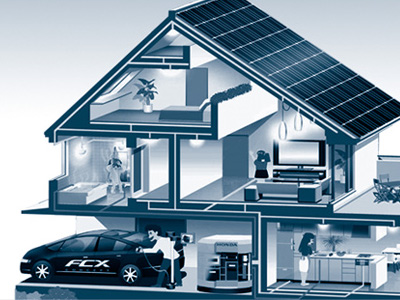07 June 2011 - Nissan Motor Co. and other Japanese automakers are turning eco-friendly cars such as electric vehicles (EVs) and hybrid cars into external power sources for the home as they aim to turn them into a type of rolling battery. The trend is getting an extra push from green cars that helped supply emergency power in areas hit by the March earthquake.
Nissan Motor President Carlos Ghosn said EVs can be used as storage batteries and supplementary power sources. Nissan is working to equip its Leaf electric cars with the ability to feed power into homes, hoping to put the new cars into showrooms later this year. That would turn the Leaf into an emergency power source during a power outage, for example, and allow electricity stored in its battery overnight to be used in the house during the day.
The Leaf uses a high-performance, 24kwh lithium-ion battery that can power the average house for about two days when fully charged. Household storage batteries with capacity of 2.5kwh currently sell for just under 2 million yen. That compares to a minimum price of 2.98 million yen for the Leaf, including government subsidies.
Battery on wheels
This fiscal year, Mitsubishi Motors Corp. plans to market an optional device that enables its EVs to supply electricity to rice cookers and other home appliances. The carmaker plans to make the device compatible with all its eco-friendly cars, including its i-MiEV electric vehicle, which is already on the road, and eight new EV and plug-in hybrids it plans to release over the next five years. "With the device, we aim to meet the type of needs that arose in areas hit by the earthquake and tsunami," said Osamu Masuko, Mitsubishi Motors' president.
Toyota Motor Corp. will consider adding a power supply function to its future eco-friendly cars, including a plug-in hybrid it plans to roll out next year, said President Akio Toyoda. Although the battery capacity of the plug-in hybrid will be smaller than those of EVs, the vehicle will be able to generate electricity using its gasoline engine. Toyota may also equip its popular Prius hybrid with a power supply function.
When eco-friendly cars come into wide use, they should help to create so-called smart cities, slashing energy consumption and acting as home storage for electricity.
Honda Motor Co. and the city of Saitama have built a house to test ways to generate electricity using solar panels, storing the power in an EV and using it in combination with electricity supplied by the power company. Using eco-friendly cars as electricity storage devices is also being discussed by an automobile strategy study group formed by the Ministry of Economy, Trade and Industry and the auto industry.
There’s still a fair way to go before such practice becomes the norm – utilising electricity from EVs and hybrids to power homes will require utilities to modify their power lines, and new legislation concerning electrical equipment will also be required.


